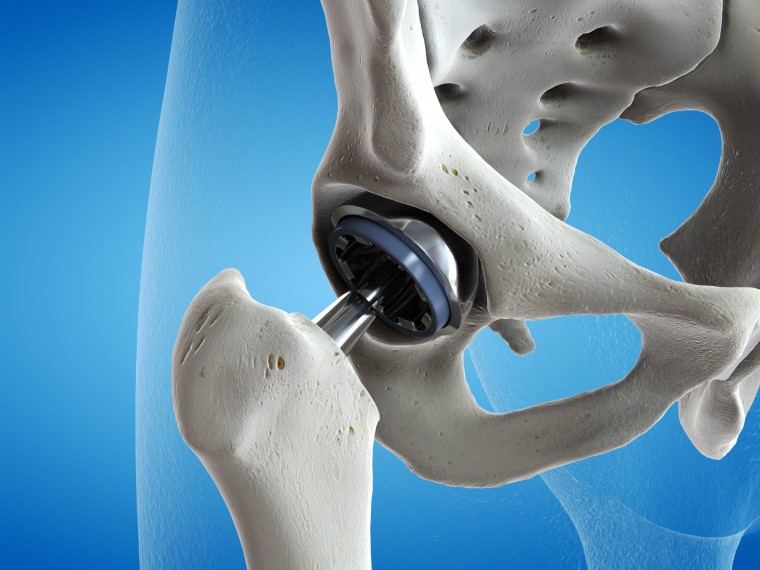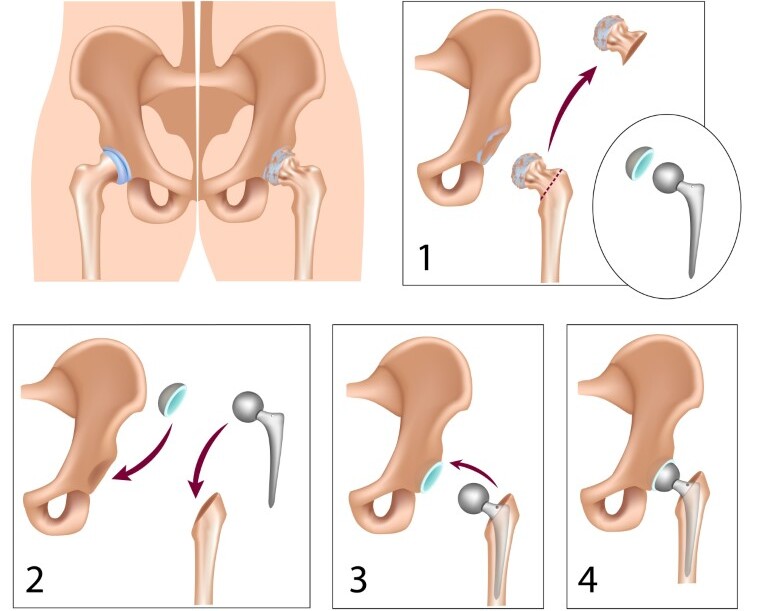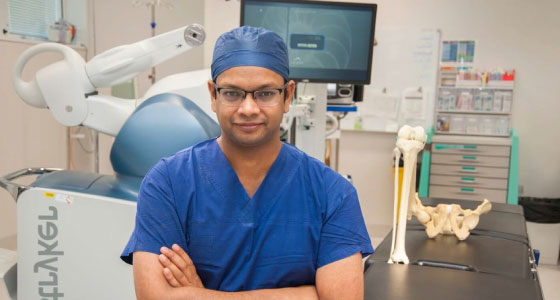Trauma, general wear and tear, and medical conditions such as hip arthritis can progressively wear out the articular cartilage protecting the hip joint surface and cause severe pain in the hips. Hip pain when caused by any of the above, can often be treated by hip replacement surgery.
Hip replacement surgery aims to eliminate pain and restore function in hips severely affected by trauma or disease. If you feel that your hip pain has significantly affected your range of motion, then you may need a hip replacement. Melbourne residents can contact us at their soonest convenience to discuss their treatment options with Dr Chandrasekaran.
What is hip replacement surgery?
A hip replacement is a surgical or invasive procedure during which your surgeon replaces the “ball and socket joint” of your hip with an artificial prosthesis. Hip replacements are some of the most successful procedures in orthopaedic practices worldwide.
Recent advances in hip replacement surgery have led to faster recovery and precision of component placement. Some of these advances include:
- Muscle Sparing hip replacement - This can be performed either through a direct anterior or direct superior hip replacement surgery. These are minimally invasive procedures that involve replacing the hip joint without cutting through or damaging any muscles or tendons.
- Robotic Total hip replacement - During robotic total hip replacements, your surgeon uses software and robotic technology to plan, execute and check the positioning of components in a hip replacement. This improves the precision and reproducibility of the surgery.

A hip replacement surgery uses prosthetic pieces to act as the acetabulum and femoral head.
When is hip replacement surgery recommended?
The principal causal indications for joint replacement surgery include:
- Osteoarthritis
- Fractured hip
- Avascular necrosis
- Dysplasia
- Inflammatory arthritis
What are the benefits of a hip replacement?
Hip replacements have been proven successful in the treatment of osteoarthritis of the hip, providing significant improvements in range of motion, and a remarkable reduction in pain. There are numerous benefits to a hip replacement including:
- High success rates - A total hip replacement is seen as one of the most successful orthopaedic procedures, proving to be a safe and effective treatment for the many problems caused by arthritis of the hip.
- Pain relief - Many patients report almost complete or complete relief from arthritic hip pain following their surgery.
- Improved mobility - Once the pain is reduced, mobility is enhanced. Your new hip joint is designed to withstand all regular stressors and ensures you can get back to carrying out regular daily activities.
- Long-lasting relief - Evidence suggests that most patients who have undergone a hip replacement report their new hips to work for over 20 years.

A hip replacement can drastically reduce pain and improve your quality of life.
Who is an ideal candidate for a hip replacement?
Hip surgery should be considered if the damage caused to your hip causes significant pain and interferes with your ability to carry out regular activities despite the use of conservative treatments. Good candidates for a hip replacement are those who:
- Suffer from progressive and severe arthritis of the hip
- Have damaged their hips as a result of trauma or injury
- Conservative or non-surgical management has proved ineffective (using medications, physiotherapy, and walking aids)
How is a hip replacement determined?
To determine whether or not a hip replacement surgery is right for you, Dr Chandrasekaran will need to perform a complete orthopaedic evaluation consisting of:
- Medical history - you will have a short conversation with Dr Siva to allow him to gather information about your overall general health. Here you will be asked a history of your hip pain and how it affects your current quality of life.
- Physical examination - Dr Siva will assess the strength and mobility of your hip.
- Medical imaging - X-rays or Magnetic Resonance Imaging Scans (MRIs) may be required to assess the extent of damage caused to your hip or check for any deformities.

We like to take a holistic approach to treatment, ensuring that you are involved in every step of your surgery.
Which hip replacement surgery is best for you?
Once your Dr Siva has completed his orthopaedic evaluation, he will review the results with you and discuss with you in detail the best surgical approach to your hip replacement. Use this time to ask your orthopaedic surgeon any questions or raise any concerns you may have regarding the procedure.

Both, total hip replacements and the direct anterior approach hip replacement involve the same steps, with the main difference being the way in which the incisions are approached.
How is a hip replacement performed?
During a total hip arthroplasty, the damaged segments of your hip are replaced with an artificial component. Your surgeon will remove the damaged femoral head and replace it with a metal stem that is placed into the hollow centre of the thigh bone. A ceramic or metal ball is then attached to the head of the stem, acting as the new femoral head.
The damaged surface of the “socket” (acetabulum) is then removed and replaced with a metal socket which is secured in place using cement or screws. A spacer called a liner is then inserted between the new components to allow for smooth gliding to facilitate hip movements.
Following your surgery, you will be either admitted to staying overnight in a hospital or be allowed to go home on the same day. This will depend on your individual situation and whether any necessary observations are required following your procedure.
Hip replacement recovery
The success of your procedure will largely depend on how well you comply with your surgeon’s postoperative instructions.
Managing pain
You will inevitably feel some pain after your surgery. Dr Siva will prescribe a short course of painkillers including paracetamol, NSAIDs, opioids, or a combination of these three. Caution is advised when taking opioids as though they are beneficial in alleviating pain, they are narcotic and addictive. Opioids should be stopped as soon as your pain improves.
Caring for your wound
Your wound dressing will be changed once in the hospital before you are discharged. You may have stitches that will be removed around 2 weeks after surgery. We encourage you to keep changing the bandage in order to prevent irritation and allow your wound to heal.
Physical rehabilitation
Physical therapy is critical to getting you back to carrying out regular activities. You will be advised of an activity program that involves a series of exercises designed to get you back to resuming your daily activities.
You should be able to return to performing lighter activities within 3-6 weeks. Bear in mind that patients recover at different rates depending on their individual characteristics.

Walking aids are recommended for at least the first 2-4 weeks to allow for safe mobility.
Cost of total hip replacement in Melbourne
The total cost of a hip replacement in Melbourne often varies depending on several factors, including:
- The type of procedure which you are having
- The extent of damage caused to your hip
- The cost of your appointments
- The price of the surgeon
- The price of the anaesthetist
- The price of any recovery attire
An initial consultation with Dr Chandrasekaran is recommended during which he will give you a breakdown of the final cost of your procedure. A Medicare rebate may be available for some. We recommend you check with your insurance provider prior to your procedure.
Why choose MOATI?
For some patients suffering from hip arthritis, surgery may be their only option to relieve pain and improve function. We here at MOATI pride ourselves on our patient-centred approach to quality care. We work with you to devise the best treatment plans suited to your individual needs.

Meet Dr Siva Chandrasekaran, our Melbourne orthopaedic surgeon. Dr Siva has trained extensively around the globe. Having completed three prestigious fellowships from the United States, United Kingdom, and Switzerland, he has developed a keen interest in treating knee and hip arthritis. Dr Siva is passionate about innovations in medicine. He has been published over 50 times and continues to search for the newest and best treatments available.
FAQs
If you still have some questions or concerns regarding a hip replacement, then check out the section below:
Like all surgery, this invasive procedure carries risks including:
- Infection
- Blood clots
- Possible dislocations
- Damage to surrounding nerves
- Leg length differences
- Increased risk of femur fracture
Once your surgery is done, you will be taken to the recovery room where your anaesthesia will be weaned off and pain medication will be administered. Some studies suggest that implementing physical therapy during this stage has been shown to considerably speed recovery.
You will be taught how to get out of bed and sit in a chair and be advised on the most appropriate way to shower and put on clothes.
A hip replacement surgery is regarded as one of the safest and most effective orthopaedic surgeries performed today.
